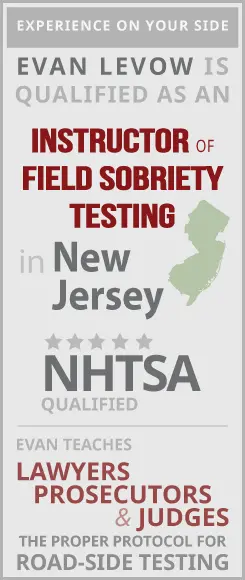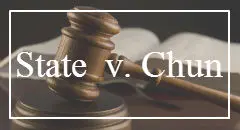What Does The Law Say About Driving While Intoxicated?
New Jersey’s law on driving while intoxicated is set forth in N.J.S.A. 39:4-50. You can find the statute’s full text here.
Defining DWI
The law begins by defining the act of impaired driving, and then lays out the various penalties that people convicted of DWI face. Driving while intoxicated is legally defined as:
“operat[ing] a motor vehicle while under the influence of intoxicating liquor, narcotic, hallucinogenic or habit-producing drug, or operat[ing] a motor vehicle with a blood alcohol concentration of 0.08% or more by weight of alcohol in the defendant’s blood or permit[ting] another person who is under the influence of intoxicating liquor, narcotic, hallucinogenic or habit-producing drug to operate a motor vehicle owned by him or in his custody or control or permit[ting] another to operate a motor vehicle with a blood alcohol concentration of 0.08% or more by weight of alcohol in the defendant’s blood.”
Note that you can be convicted of DWI for allowing an intoxicated driver to operate your car.
The main purpose of this section is to define two separate ways of determining intoxication:
1. Per Se Violation
This method is supposed to be as objective as possible. Cases involving a per se violation only take into account the results of chemical tests that are based on averages. If a blood, urine or breath test determines your blood alcohol content (BAC) at or above 0.08%, you can be charged with DWI.
With that being said, proving intoxication can be difficult. Each form of chemical testing is subject to an array of possible errors, and police officers often make their own mistakes. With the help of an aggressive defense attorney, breath, blood and urine tests can be suppressed.
2. Under The Influence
This method relies more on subjective impressions and interpretations: the observations of the arresting police officer and the results of any field sobriety tests that were administered.
In many cases, there will not be a breath or blood test result, either due to a refusal to submit to testing or because the test results were suppressed. The “under the influence” violation is based on the “totality of the circumstances”, which include driving activity, interaction with the police officer, physical attributes, such as the alleged odor of alcohol, bloodshot eyes, slurred voice, verbal interaction with the officer, and physical results of field sobriety exercises.
There are many possible defenses that can invalidate the results of field sobriety testing. Being charged with DWI does not mean that a conviction is automatic, especially when a qualified DWI lawyer is at your side.
What Are The Penalties If I Am Convicted?
The rest of the statute defines the mandatory penalties assessed after conviction.
At a minimum, conviction carries between $4,000.00 and up to more than $10,000.00 in fines and surcharges, along with a requisite license suspension and installation of an ignition interlock device. Beyond that, additional fees, mandatory alcohol education, and possible jail time may all be assessed.
Penalties vary considerably in relation to prior convictions and depending on the breath alcohol content (BAC).
Find a comprehensive overview of New Jersey’s penalties for DWI here.
Is DWI A Criminal Charge In New Jersey?
No, DWI is a traffic offense. It is NOT a criminal offense. You are not finger-printed. The arrest record will not show up in any criminal database. If you are convicted, the conviction will only show up in Motor Vehicle Commission records.
Because it is a traffic offense, there are no jury trials in DWI cases in New Jersey.
Driving while intoxicated is a criminal charge in most other states. If you live in another state and are convicted of DWI in New Jersey, the conviction will transfer to your home state “administratively,” but not criminally. In other words, other than probable additional loss of driving privileges in your home state, you will not be prosecuted again for a criminal offense. However, it will count in the future as an enhancing factor if you are charged in your home state with a subsequent offense.
But DWI is the most serious traffic offense you can be charged with. And it can have far-reaching effects, beyond the loss of your license. Contact our experienced defense attorneys to discuss your options.
Can I Get A Work License?
Many states allow limited driving privileges for work, religious observance and necessary trips like shopping and doctor’s visits.
New Jersey does not allow any work or temporary driving permits or licenses. If you are convicted of DWI, you will lose your license for varying periods of time, depending on whether this is a first, second, or third offense. Please contact us to discuss the specifics of license suspension with regard to your personal circumstances.
If you are licensed in another state, you can drive anywhere else, unless or until your home state suspends your driving privileges based on your conviction in New Jersey, but you cannot drive in New Jersey for the period you are suspended.
What Happens If An Accident Resulted In My DWI Charge?
If anyone other than you is injured in an accident where you are proven to be driving under the influence of alcohol or drugs, or having refused to submit to testing, you can be prosecuted for Assault by Auto, and could face lengthy prison time.
If you are injured in an accident, yet proven to be under the influence or having refused to submit to testing, it is likely that you will be unable to file a monetary claim for your injuries against the other driver, even if you are rear-ended.
New Jersey’s Statute 39:6A – 4.5(b) states:
“Any person who is convicted of, or pleads guilty to, operating a motor vehicle in violation of R.S.39:4-50, section 2 of P.L.1981, c. 512 (C.39:4-50.4a), or a similar statute from any other jurisdiction, in connection with an accident, shall have no cause of action for recovery of economic or noneconomic loss sustained as a result of the accident.”
You would, however, be entitled to Personal injury protection (PIP) auto insurance or medical benefits for any injuries suffered in the accident.
If you are in this unfortunate situation, you should consider aggressively defending the case against you.
Why Was I Tested After My Accident?
Statute 39:4-50 specifically mentions this situation:
“Whenever an operator of a motor vehicle has been involved in an accident resulting in death, bodily injury or property damage, a police officer shall consider that fact along with all other facts and circumstances in determining whether there are reasonable grounds to believe that person was operating a motor vehicle” while intoxicated.
In other words, if you were involved in an accident that caused damages, the responding police officer may be able to use that fact to establish probable cause for a sobriety test. But they have to take into consideration “all other facts and circumstances,” as well. The fact that you were in an accident is usually not enough, on its own, to establish probable cause. Instead, the officer should evaluate your manner, behavior, and speech before asking.


